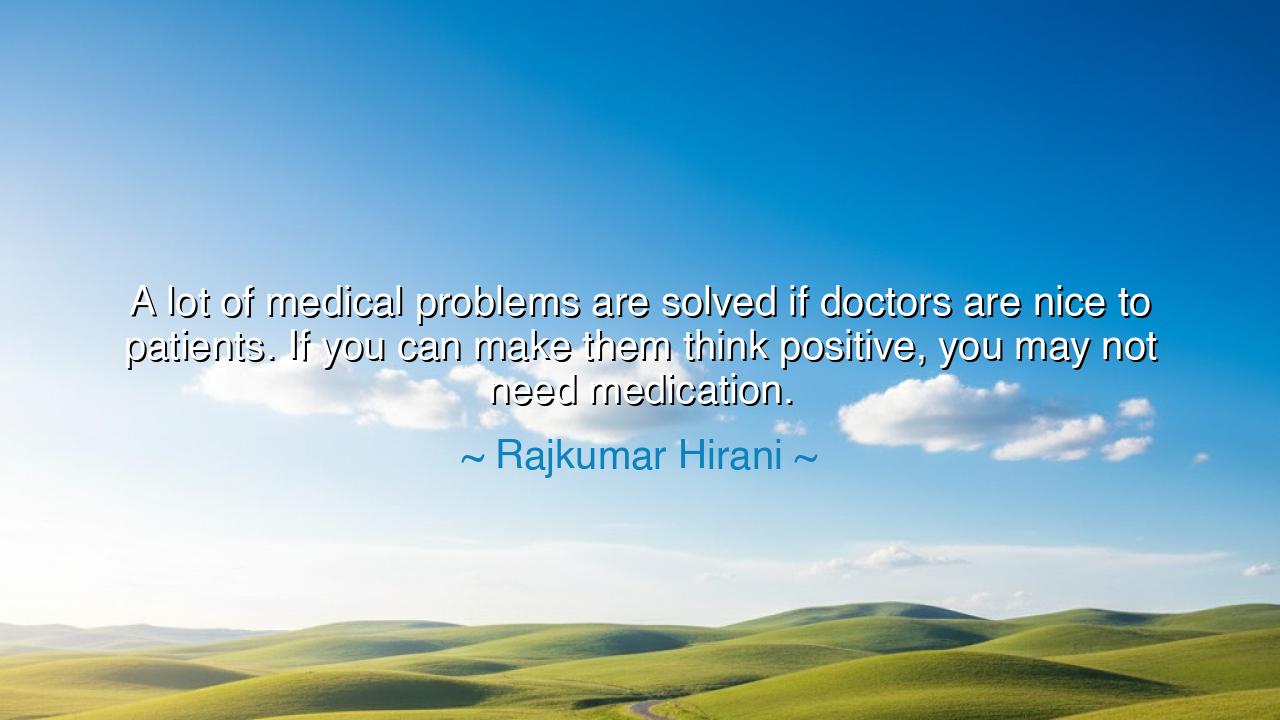
A lot of medical problems are solved if doctors are nice to
A lot of medical problems are solved if doctors are nice to patients. If you can make them think positive, you may not need medication.






The words of Rajkumar Hirani fall upon the heart like a healing balm: “A lot of medical problems are solved if doctors are nice to patients. If you can make them think positive, you may not need medication.” This saying, though born in the modern world, carries the wisdom of ancient healers and the warmth of timeless compassion. It is not a mere reflection on medicine—it is a revelation about the spirit of healing itself. For long before the scalpel and the pill, it was the heart of the healer that restored the sick and lifted the weary.
In every age, humanity has sought to understand the mystery of health—not only in the body, but in the mind and soul. The ancients believed that illness did not dwell solely in the flesh; it took root in fear, grief, and despair. Thus, the true physician was not merely one who mastered herbs or surgery, but one who could speak peace into suffering. Hirani’s words are a return to this sacred truth: that kindness is not an accessory to medicine, but its oldest and most enduring form. A doctor’s empathy can mend what medicine alone cannot touch.
Let us remember the tale of Sir William Osler, the father of modern medicine, who walked among his patients not as a distant scholar but as a friend. When others saw only disease, he saw humanity. He was known to sit by the bedside, to listen, to smile, to offer hope even when science could offer little else. And many times, when the medicine failed, the patient lived—because their heart had been comforted, their courage rekindled. From him, and from countless healers across time, we learn that the mind’s belief in recovery can summon the body to follow.
Modern science, too, has come to bow before this ancient wisdom. Studies have shown that a positive mindset strengthens the immune system, quickens recovery, and reduces pain. What the mystics once called “faith,” we now know as psychological resilience. Yet, the mystery remains the same: when a patient feels cared for, their body remembers how to heal. A harsh word may wound deeper than any disease, but a gentle one can awaken the strength that lies sleeping within. Thus, the doctor’s kindness becomes as potent as any medicine, and their compassion, a form of divine alchemy.
In truth, Hirani’s quote speaks to more than doctors—it speaks to all who would bring healing into the world. For we are each physicians of the hearts around us. Our words can lift or crush, our tone can heal or harm. Every act of gentleness, every spark of encouragement, becomes a dose of medicine for another’s spirit. To make someone think positive is not to deceive them with false hope, but to remind them of their own strength, to point their eyes toward the light when all seems dark.
The ancients taught that the healer must first heal themselves—that one cannot pour calm into others while their own heart is storming. So, too, must the modern healer cultivate patience, humility, and empathy. The white coat should be more than a symbol of science; it should be a mantle of service, woven with compassion. A doctor’s greatest tool is not the stethoscope or the syringe, but the ability to listen deeply and to care sincerely. Where medicine ends, kindness begins—and together, they form the bridge between pain and peace.
So, my child of wisdom, take this teaching as a guiding flame: whether you are a doctor, a friend, or a stranger, remember that kindness heals. Speak softly to those in suffering; remind them that they are not alone. Offer hope as you would offer water to the thirsty. For every smile, every gentle word, every act of understanding is a thread in the great tapestry of healing that binds all hearts together.
In the end, the lesson is clear and eternal: the medicine of kindness never expires, and the power of positivity has no limit. The healer’s touch begins in the heart, not the hand. Let us then become healers in our own way—restoring not just bodies, but spirits—until the world itself becomes a hospital of hope, and compassion its everlasting cure.






AAdministratorAdministrator
Welcome, honored guests. Please leave a comment, we will respond soon